Biology 2018 JAMB Past Questions
Biology 2018 JAMB Past Questions
1.A group of closely related organisms capable of interbreeding to produce the fertile offspring are known as members of a
- A. Kingdom
- B. class
- C. family
- D. species
Explanation
Species could be likened to offspring or heredity of a lineage. Hence, they are alike
2. A beaker of
pond water containing few specimens of Euglena was placed in a dark room
for two weeks. At the end of this period, the specimens of Euglena were
still alive because they were
- A. able to carry out holozoic nutrition
- B. able to carry out photosynthesis using carbon dioxide in the pond water
- C. better adapted to life in darkness than to life in light
- D. not overcrowded
3.The cytoplasm of a cell is considered a very important component because it
- A. regulates the amount of energy in the cell
- B. suspends all cell organelles
- C. is the outermost part of the cell
- D. is solely responsible for cell division
4
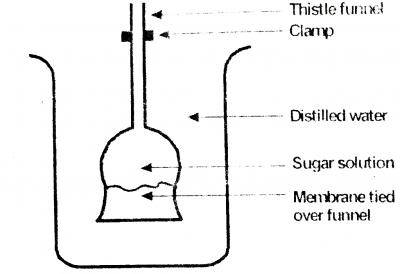
Use the diagram shown to answer the question. After an hour, the level of water in the thistle funnel will
- A. rise
- B. fall
- C. remain the same
- D. double
Correct Answer: Option A
5
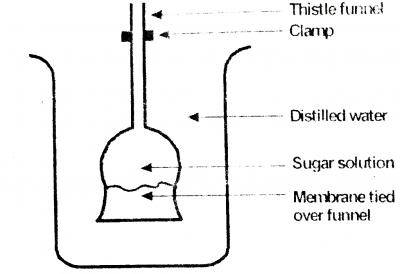
Use the diagram shown to answer the question. The experiment above is used to demonstrate the process of
- A. transportation
- B. water culture
- C. diffusion
- D. osmosis
6
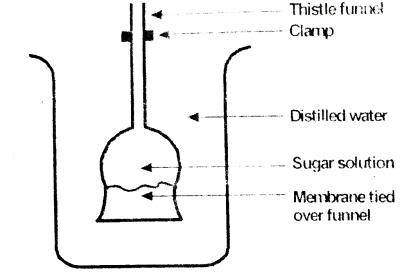
Use the diagram shown to answer the question. In plant cells, the role of the membrane is played by the
- A. nucleolus
- B. cell wall
- C. cytoplasm
- D. mitochondrion
7. Red blood cells were found to have burst open after being placed in distill for an hour. This phenomenon is known as
- A. plasmolysis
- B. diffusion
- C. haemolysis
- D. wilting
8.The curvature movement of plants in response to the stimulus of water is called
- A. hydrotropism
- B. geotropism
- C. Phototropism
- D. thigmotropism
9.The overall reaction in glycolysis can be summarised as
- A. CHO -----> CHO+ 4H + ATP
Correct Answer: Option B
10.The longest bone in the body is the
11. Which of the following structures is not a skeletal material?
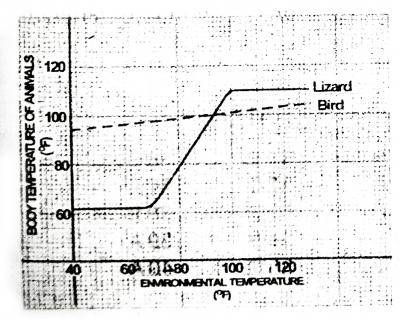
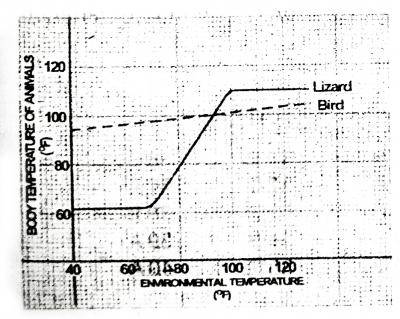
21. Which of the following processes removes carbon from the atmosphere?
- A. humerous
- B. femur
- C. scapula
- D. tibia
11. Which of the following structures is not a skeletal material?
- A. Chitin
- B. Cartilage
- C. Bone
- D. Muscle
12. The reason why the flow of blood through the capillaries is very slow is
- A. because the walls of Capillaries are very thin
- B. to avoid high blood pressure
- C. to ensure that the individual does not get dizzy
- D. to allow adequate time for exchange of materials
13.Which of the following groups of organisms has kidney as the excretory organ?
- A. Fishes, amphibians, birds, man
- B. Fishes, amphibians, annelids, insects
- C. Fishes, reptiles, birds, tapeworm
- D. Fishes, protozoans, amphibians, man
14.Which of the following features is not a characteristic of arteries? Arteries
- A. possess valves at internals throughout their length
- B. have thick muscular and elastic walls
- C. carry blood away from the heart
- D. transport oxygenated blood with the exception of the pulmonary artery
15

The graph below shows the
results of a laboratory investigation which measured the body
temperatures of a lizard and a bird under changing artificial
conditions. Use it to answer the question.
Which of the statements below is valid?
Which of the statements below is valid?
- A. The bird's blood was always warmer than that of the lizard
- B. The body temperature of the bird varied less than that of the lizard during changes in environmental temperature
- C. The body temperature of the bird remained constant despite changes in environmental temperature
- D. The body temperature of the lizard was always close to that of the environmental temperature
16

The graph below shows the
results of a laboratory investigation which measured the body
temperatures of a lizard and a bird under changing artificial
conditions. Use it to answer the question.
What physiological term can used to describe the regulation of the body temperature of the of the Lizard?
What physiological term can used to describe the regulation of the body temperature of the of the Lizard?
- A. Homeostasis
- B. Homoithermy
- C. Poikilothermy
- D. Osmoregulation
17. The reason why hospitals use saline solutions as drip Instead of water is
- A. because salt is a preservative
- B. to prevent contamination of the body
- C. to maintain the composition of body fluids
- D. to increase the number of blood cells
18.The part of the ear which contains nerve cells sensitive to sound vibrations is the
- A. cochlea
- B. ampulla
- C. tympanum
- D. malleus
19. Spectacles with convex lenses correct long-sightedness by
- A. converging the light rays before they enter the eye
- B. diverging the light rays before they enter the eye
- C. reducing the light intensity before it enters the eye
- D. increasing the light intensity before it enters the eye
20. A seed of a flowering plant can best be described as
- A. radicle and plumule
- B. the developed ovule
- C. the embryo and endosperm
- D. developed ovary
21. Which of the following processes removes carbon from the atmosphere?
- A. putrefaction
- B. photosynthesis
- C. volcanic eruption
- D. burning of fuels
22. Which of the following cycles involves the process of precipitation and transpiration?
- A. water cycles
- B. carbon cycle
- C. nitrogen cycle
- D. oxygen cycle
23. What is the critical limiting factor for plants below the photic zone in an aquatic ecosystem?
- A. availability of nutrients
- B. availability of water
- C. intensity of light
- D. carbon dioxide concentration
24. Which of the following instruments is used to estimate the number of plants in a habitat?
- A. pooter
- B. pitfall trap
- C. quadrant
- D. sweep net
25. Which of the following statements is true about sandy soil?
- A. has limited air space
- B. is light and easy to dig
- C. drains slowly
- D. is heavy and poorly aerated
26. Which of the following organisms is a primary consumer?
- A. dog
- B. sheep
- C. grass
- D. fungus
27. Study the diagram of a food chain shown and use; it to answer the question.
P ---> Q ---> R ---> S ---> T
The organism designated P in the food chain above is normally sustained by energy from
The organism designated P in the food chain above is normally sustained by energy from
- A. sunlight
- B. carbohydrates
- C. green plants
- D. mineral salts
28. Study the diagram of a food chain shown and use; it to answer the question.
P ---> Q ---> R ---> S ---> T
Which of the following statements best describes the organism designated R? It
Which of the following statements best describes the organism designated R? It
- A. feeds on S
- B. is a primary consumer
- C. is a producer as well as a consumer
- D. is a secondary consumer
29. Which of the following diseases is not hereditary?
- A. Albinism
- B. Scabies
- C. Haemophilla
- D. Colour blindness
30. The immediate product of meiosis in flowering plants is the
- A. sporophyte
- B. gametophyte
- C. zygote
- D. pollen grains
31. DNA in eukaryotic cells is contained in the
- A. central vacuole
- B. nucleus
- C. lysosome
- D. golgi body
32. A man who is
heterozygous for the disease haemophilia marries a woman who is double
recessive for haemophilia. What percentage of their offspring would have
the disease?
- A. 0%
- B. 25%
- C. 50%
- D. 75%
33. Cytokinesis of mitosis is a process that ensures that
- A. each daughter cell gets the necessary organelles
- B. there is distribution of a complete set of genes into each daughter cell
- C. daughter cell inherit new genetic combinations
- D. worn out organelles are excluded from daughter cells
34. An animal which is active during the day is known as a
- A. nocturnal animal
- B. diurnal animal
- C. terrestrial animal
- D. homortacmic animal
35.Evidence of evolution include the following except
- A. fossil records
- B. comparative anatomy
- C. mutation of genes
- D. geographical distribution of organisms
36
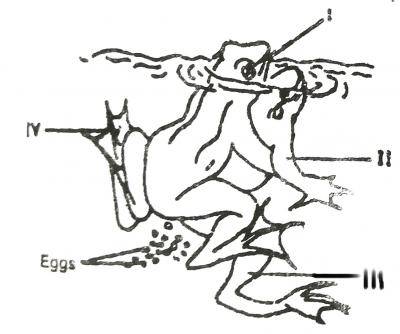
Use the diagram to answer the question. The diagram shows that the organisms are
- A. hermaphrodite
- B. viviparous
- C. oviparous
- D. ovoviparous
37
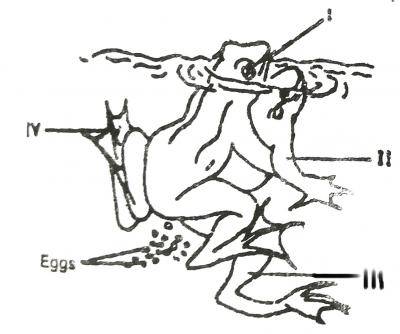
Use the diagram to answer the question. The breeding posture illustrated in the diagram is knows as
- A. mating
- B. amplexus
- C. courtship display
- D. reproductive swimming
Correct Answer: Option B
Explanation
Amplexus is the term used to describe the mating process of toads and frogs.
38. An accurate identification of a rapist can be carried out by conducting
- A. RNA analysis
- B. DNA analysis
- C. blood group test
- D. behavioural tests
39. A boy who is fond of swimming in a pond finds himself passing urine with traces of blood. He is like to have contracted?
- A. schistosomiasis
- B. onchocerciasis
- C. poliomyelitis
- D. salmonellosis
40. The flippers of a whale and the fins of a fish are examples of
- A. divergent evolution
- B. co-evolution
- C. continuous variation
- D. convergent evolution
41. According to James, when we meet various trials in life, we should_____________
- A. rejoice because the Lord is good
- B. bless God’s name
- C. count it all Joy
- D. call upon the name of the Lord
Correct Answer: Option C
Explanation
"My brethren, count it all joy when ye fall into divers temptations; " (James 1:2)
42. The yellowish colored liquid component of blood that normally holds the blood cells in suspension is
- A. serum
- B. plasma
- C. water
- D. thrombocyte
Explanation
Blood plasma is a yellowish colored liquid component of blood that normally holds the blood cells in whole blood in suspension; this makes plasma the extracellular matrix of blood cells. It makes up about 55% of the body's total blood volume.blood plasma is a light yellow liquid, similar to the color of straw. Along with water, plasma carries salts and enzymes. The primary purpose of plasma is to transport nutrients, hormones, and proteins to the parts of the body that need it
43.The function of pith in plant is
- A. Absorb mineral salt and nutrient from the soil
- B. Pith, or medulla, is a tissue in the stems of vascular plants. Pith is composed of soft, spongy parenchyma cells, which store and transport nutrients throughout the plant.
- C. trap chlorophyll from the sunlight
- D. Removal of waste product from the plant
Explanation
trap chlorophyll from the sunlight
44. A pollutant that is mostly associated with acid rain is
- A. Nitrogen (IV) oxide
- B. Ozone
- C. Flourine
- D. Carbony (IV) oxide
Explanation
The main chemicals in air pollution that create acid rain are sulfur dioxide (SO2) and nitrogen (NOx). Acid rain usually forms high in the clouds where sulfur dioxide and nitrogen oxides react with water, oxygen, and oxidants. This mixture forms a mild solution of sulfuric acid and nitric acid.Nitrogen dioxide and nitric oxide are referred to together as oxides of nitrogen (NOx). NOx gases react to form smog and acid rain
45. What is the function of contractile vacuole in paramecium?
- A. Produces Enzymes
- B. Gets rid of excreta
- C. Stores and digest food
- D. Gets rid of excess water
Correct Answer: Option D
: Excretion of water in Paramecium is carried out by the Contractile vacuoles
Explanation
Osmoregulation. Paramecium and amoeba live in fresh water. Their cytoplasm contains a greater concentration of solutes than their surroundings and so they absorb water by osmosis. The excess water is collected into a contractile vacuole which swells and finally expels water through an opening in the cell membrane.: Excretion of water in Paramecium is carried out by the Contractile vacuoles
46. An organism which exhibit extracellular digestion is
- A. Spirogyra
- B. Paramecium
- C. Amoeba
- D. Rhizopus
Explanation
Extracellular digestion is a process in which saprobionts feed by secreting enzymes through the cell membrane onto the food. The enzymes catalyze the digestion of the food into molecules small enough to be taken up by passive diffusion, transport, or phagocytosis. Rhizopus use extracellular digestion.
47. How many days does is used for incubation of an egg to release chick
- A. 21
- B. 22
- C. 20
- D. 23
Correct Answer: Option A
Explanation
On the 21st day of incubation the chick finishes its escape from the shell. The initial break in the shell is made by the egg tooth. This is referred to as external pipping
48. The four classes of cnidarian include the following except
Turbellaria are one of the traditional sub-divisions of the phylum Platyhelminthes (flatworms)
- A. Turbellaria
- B. Anthozoa
- C. Scyphozoa
- D. cubozoa
Correct Answer: Option A
Explanation
Modern cnidarians are generally classified into four main classes: sessile Anthozoa (sea anemones, corals, sea pens); swimming Scyphozoa (jellyfish) and Cubozoa (box jellies); and HydrozoaTurbellaria are one of the traditional sub-divisions of the phylum Platyhelminthes (flatworms)
49
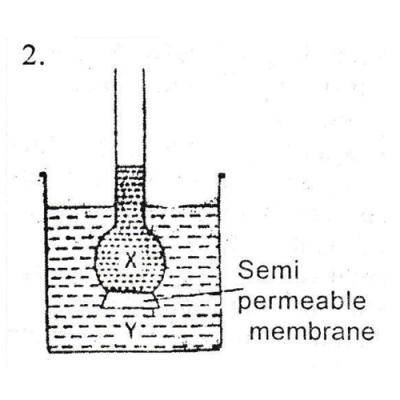
What would happen if solution Y is more concentrated than solution X in fig 2
- A. The level of X would rise, Y would falls
- A. The level of X would rise, Y would rise
- C. The level of X and Y stands the same
- D. The level of Y would rise, X would fall.
Correct Answer: Option D
This explain osmosis
Explanation
Osmosis is the spontaneous net movement of solvent molecules through a selectively permeable membrane into a region of higher solute concentration, in the direction that tends to equalize the solute concentrations on the two sides Therefore, the level of Y (region of higher concentration) would rise, X (region of lower concentration) would fall to equalize the solute concentrations on the two sidesThis explain osmosis
50. Physiological adaptation to very dry conditions in animal demonstrates
- A. Xeromorphism
- B. Hibernation
- C. Aestivation
- D. Rejuvenation
Correct Answer: Option B
Hibernation is a state of inactivity and metabolic depression in endotherms. Hibernation refers to a season of heterothermy characterized by low body temperature, slow breathing and heart rate, and low metabolic rate
Explanation
Xeromorphic describe the structural modifications of certain plants (xerophytes) that enable them to reduce water loss, particularly from their leaves and stems.Hibernation is a state of inactivity and metabolic depression in endotherms. Hibernation refers to a season of heterothermy characterized by low body temperature, slow breathing and heart rate, and low metabolic rate



Comments
Post a Comment